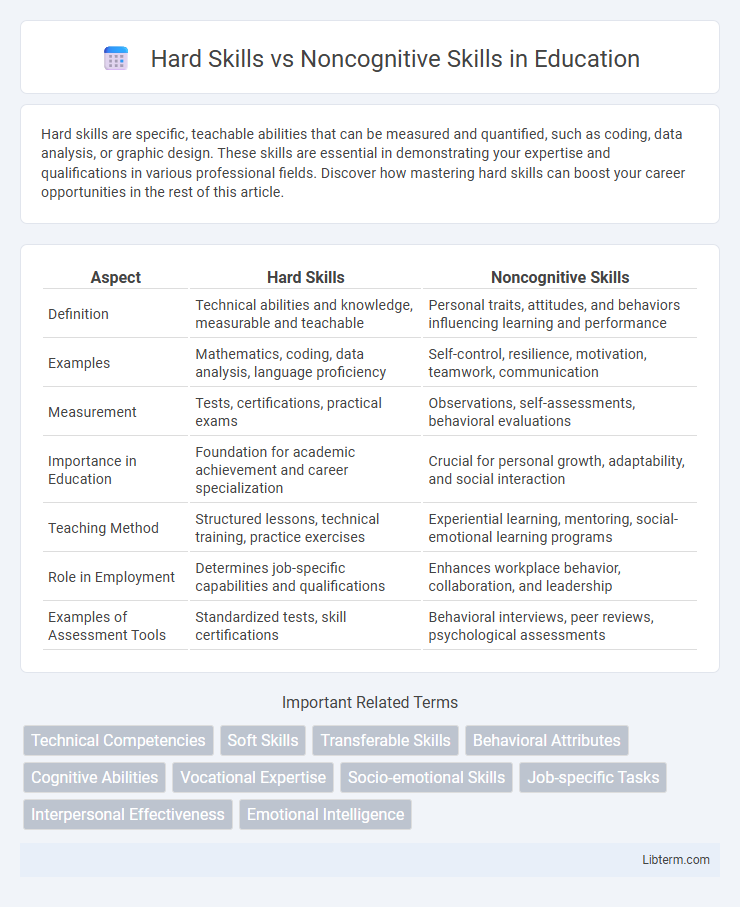Hard skills are specific, teachable abilities that can be measured and quantified, such as coding, data analysis, or graphic design. These skills are essential in demonstrating your expertise and qualifications in various professional fields. Discover how mastering hard skills can boost your career opportunities in the rest of this article.
Table of Comparison
| Aspect | Hard Skills | Noncognitive Skills |
|---|---|---|
| Definition | Technical abilities and knowledge, measurable and teachable | Personal traits, attitudes, and behaviors influencing learning and performance |
| Examples | Mathematics, coding, data analysis, language proficiency | Self-control, resilience, motivation, teamwork, communication |
| Measurement | Tests, certifications, practical exams | Observations, self-assessments, behavioral evaluations |
| Importance in Education | Foundation for academic achievement and career specialization | Crucial for personal growth, adaptability, and social interaction |
| Teaching Method | Structured lessons, technical training, practice exercises | Experiential learning, mentoring, social-emotional learning programs |
| Role in Employment | Determines job-specific capabilities and qualifications | Enhances workplace behavior, collaboration, and leadership |
| Examples of Assessment Tools | Standardized tests, skill certifications | Behavioral interviews, peer reviews, psychological assessments |
Defining Hard Skills and Noncognitive Skills
Hard skills refer to specific, teachable abilities or knowledge sets, such as coding, data analysis, or foreign language proficiency, that are measurable and typically acquired through formal education or training. Noncognitive skills, often called soft skills, encompass traits like emotional intelligence, resilience, communication, and teamwork, which influence behavior and interpersonal interactions but are less tangible and harder to quantify. Understanding the distinction between these skills is essential for effective workforce development and personal growth strategies.
Key Differences Between Hard and Noncognitive Skills
Hard skills consist of specific, teachable abilities such as coding, data analysis, and technical proficiency, which are often quantifiable and acquired through education or training. Noncognitive skills, including emotional intelligence, communication, adaptability, and perseverance, focus on behavior, personality traits, and interpersonal interactions essential for workplace success. The key difference lies in hard skills being measurable and role-specific, while noncognitive skills influence how effectively individuals apply hard skills in real-world contexts.
Importance of Hard Skills in the Modern Workplace
Hard skills, including technical expertise, software proficiency, and industry-specific certifications, are crucial for job performance and career advancement in the modern workplace. Employers prioritize measurable competencies such as coding, data analysis, and project management to ensure efficiency and productivity. Mastery of hard skills enables workers to adapt to technological advancements and meet the increasing demands of specialized roles.
The Role of Noncognitive Skills in Career Success
Noncognitive skills such as emotional intelligence, perseverance, and communication significantly impact career success by enhancing workplace relationships and adaptability. Research shows employers increasingly value these skills for leadership potential and team collaboration beyond technical expertise. Developing strong noncognitive skills complements hard skills, driving long-term professional growth and job performance.
Developing Hard Skills: Strategies and Resources
Developing hard skills requires targeted training through online courses, technical workshops, and certification programs offered by platforms like Coursera, Udemy, and LinkedIn Learning. Consistent practice and hands-on experience in real-world projects enhance proficiency in areas such as coding, data analysis, or financial modeling. Leveraging resources like textbooks, industry journals, and mentorship accelerates mastery of specific technical competencies essential for career advancement.
Cultivating Noncognitive Skills: Tips and Techniques
Cultivating noncognitive skills such as emotional intelligence, resilience, and teamwork involves consistent practice in real-life scenarios and reflection. Techniques like mindfulness exercises, role-playing, and feedback sessions enhance self-awareness and social interaction abilities. Developing these skills complements hard skills by improving adaptability and communication in professional environments.
Measuring and Assessing Skill Types
Measuring hard skills typically involves standardized tests, certifications, and practical demonstrations that quantify technical proficiency and knowledge. Noncognitive skills, such as emotional intelligence, perseverance, and teamwork, require qualitative assessments like behavioral interviews, self-reports, and peer evaluations to gauge attitudes and interpersonal abilities. Combining both assessment types provides a comprehensive evaluation of a candidate's capabilities essential for job performance and personal development.
Industry Examples: Balancing Hard and Noncognitive Skills
In the technology sector, software engineers require hard skills such as coding languages and system architecture, while noncognitive skills like teamwork and problem-solving enhance project outcomes and innovation. In healthcare, precise knowledge of medical procedures is complemented by empathy and communication to improve patient care and collaboration. Manufacturing industries benefit from technical expertise in machinery operation and quality control paired with adaptability and time management to optimize production efficiency.
The Future of Skills in a Changing Job Market
Hard skills such as coding, data analysis, and technical proficiency remain essential for adapting to automation and AI-driven industries. Noncognitive skills like emotional intelligence, adaptability, and problem-solving are increasingly valued for navigating complex, dynamic workplaces and fostering collaboration. The future job market prioritizes a balanced integration of hard and noncognitive skills to ensure long-term career resilience and innovation.
Integrating Both Skill Types for Optimal Performance
Integrating hard skills, such as technical expertise and data analysis, with noncognitive skills like emotional intelligence and resilience enhances overall job performance and adaptability in dynamic work environments. Companies investing in training programs that develop both skill sets report improved problem-solving abilities and stronger team collaboration. Balanced skill development supports innovative thinking and effective communication, driving sustained organizational success.
Hard Skills Infographic

 libterm.com
libterm.com